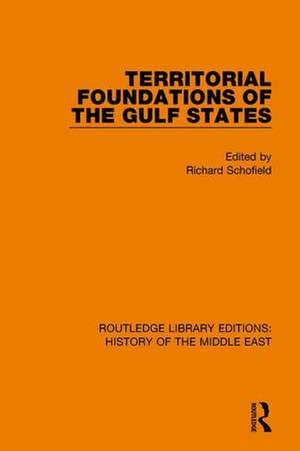Territorial Foundations of the Gulf States: Routledge Library Editions: History of the Middle East
Editat de Richard Schofielden Limba Engleză Paperback – 9 mai 2018
| Toate formatele și edițiile | Preț | Express |
|---|---|---|
| Paperback (1) | 323.23 lei 6-8 săpt. | |
| Taylor & Francis – 9 mai 2018 | 323.23 lei 6-8 săpt. | |
| Hardback (1) | 764.20 lei 6-8 săpt. | |
| Taylor & Francis – 2 noi 2016 | 764.20 lei 6-8 săpt. |
Din seria Routledge Library Editions: History of the Middle East
-
 Preț: 320.58 lei
Preț: 320.58 lei -
 Preț: 487.62 lei
Preț: 487.62 lei -
 Preț: 318.44 lei
Preț: 318.44 lei -
 Preț: 323.23 lei
Preț: 323.23 lei -
 Preț: 323.23 lei
Preț: 323.23 lei - 35%
 Preț: 5575.93 lei
Preț: 5575.93 lei -
 Preț: 349.80 lei
Preț: 349.80 lei -
 Preț: 218.38 lei
Preț: 218.38 lei -
 Preț: 356.44 lei
Preț: 356.44 lei -
 Preț: 349.80 lei
Preț: 349.80 lei -
 Preț: 462.90 lei
Preț: 462.90 lei -
 Preț: 355.48 lei
Preț: 355.48 lei -
 Preț: 356.44 lei
Preț: 356.44 lei
Preț: 323.23 lei
Nou
Puncte Express: 485
Preț estimativ în valută:
61.87€ • 67.23$ • 52.00£
61.87€ • 67.23$ • 52.00£
Carte tipărită la comandă
Livrare economică 21 aprilie-05 mai
Preluare comenzi: 021 569.72.76
Specificații
ISBN-13: 9781138221277
ISBN-10: 1138221279
Pagini: 268
Dimensiuni: 156 x 234 x 14 mm
Greutate: 0.45 kg
Ediția:1
Editura: Taylor & Francis
Colecția Routledge
Seria Routledge Library Editions: History of the Middle East
Locul publicării:Oxford, United Kingdom
ISBN-10: 1138221279
Pagini: 268
Dimensiuni: 156 x 234 x 14 mm
Greutate: 0.45 kg
Ediția:1
Editura: Taylor & Francis
Colecția Routledge
Seria Routledge Library Editions: History of the Middle East
Locul publicării:Oxford, United Kingdom
Public țintă
Postgraduate and UndergraduateCuprins
1. Borders and Territoriality in the Gulf and the Arabian Peninsula During the Twentieth Century Richard Schofield 2. Concepts of Sovereignty in the Gulf Region George Joffé 3. Britain’s Role in Boundary Drawing in Arabia: A Synopsis John C. Wilkinson 4. Practical Problems of Boundary Delimitation in Arabia: The Case of the United Arab Emirates Julian Walker 5. Iraq’s Claim to Sovereignty over Kuwait Maurice Mendelson and Susan Hulton 6. The Kuwaiti Islands of Warbah and Bubiyan, and Iraqi Access to the Gulf Richard Schofield 7. Maritime Delimitation in the Gulf Rodman R. Bundy 8. Cross-Border Hydrocarbon Reserves David Pike 9. Shared Zones as a Solution to Problems of Territorial Sovereignty in the Gulf States Gerald Blake 10. Contemporary Oil Exploration and Development Policies in the Gulf Region Paul Stevens 11. Hydrocarbons and Iranian Policies Towards the Gulf States: Confrontation and Cooperation in Island and Continental Shelf Affairs Keith McLachlan
Descriere
Based on expert analysis by leading researchers, this book, first published in 1994, deals with the origins and contemporary status of land and maritime boundaries in the Gulf and Arabian Peninsula. The 1990 Iraqi invasion of Kuwait was the gravest challenge yet posed to the system of small states established by Britain. Immediately, questions were raised: How had this territorial framework evolved? What was its raison d’être? How capable was it of withstanding serious internal and external upheaval? This book reviews these and related concerns from a variety of informed perspectives: those of the boundary-maker, international lawyer, oil economist, and political and historical geographer.
